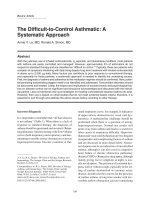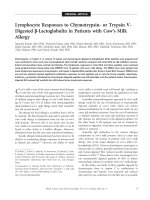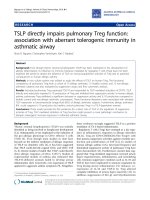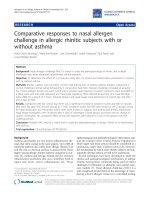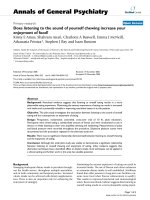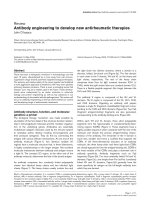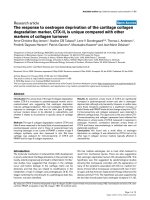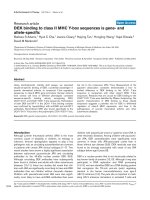Báo cáo y học: "Applying logic to pulmonary artery catheter use" docx
Bạn đang xem bản rút gọn của tài liệu. Xem và tải ngay bản đầy đủ của tài liệu tại đây (57.85 KB, 1 trang )
Page 1 of 1
(page number not for citation purposes)
Available online />Mansour and colleagues recommend not routinely using the
pulmonary artery catheter to guide hemodynamic manage-
ment in the intensive care unit, because the perceived
benefits are largely intangible [1]. Pulmonary artery catheter
monitoring of the right ventricular ejection fraction (RVef) and
of the right ventricular end-diastolic volume (EDV), however,
reflects powerful yet underutilized relationships that assess
right ventricular performance.
Since the cardiac output equals the product of the RVef, the
EDV and the heart rate, one can assess the RVef to EDV
relations as direct measures of right ventricular performance.
A series of RVef, EDV and heart rate combinations can give
the same cardiac output (Figure 1); monitoring or targeting
cardiac output alone ignores this reality. For example, in
hypovolemia the EDV is low and the RVef is increased,
whereas in right ventricular failure the opposite is true.
Furthermore, resuscitation from hypovolemia will increase the
EDV and decrease the RVef [2], while reversal of cor
pulmonale will decrease the EDV and increase the RVef.
No monitoring device other than the pulmonary artery
catheter can continually assess these variables. These
concepts are often used in the cardiac surgery suite, but are
rarely codified for diagnosis and management. Monitoring
devices can improve outcome only if they are coupled to
treatments that improve outcome. Applying the above logic to
previously proposed treatment protocols, such as using the
mixed venous oxygen saturation [3], may therefore be the first
step toward defining pulmonary artery catheter utility [4].
Competing interests
The authors declare that they have no competing interests.
References
1. Mansour W, Milbrandt EB, Emlet LL: PAC in FACCT: time to
PAC it in? Crit Care 2008, 12:301.
2. Dhainaut JF, Pinsky MR, Nouria S, Slomka F: Right ventricular
function in human sepsis: a thermodilution study. Chest 1997,
112:1043-1049.
3. Pinsky MR, Vincent J-L: Let us use the pulmonary artery
catheter correctly and only when we need it. Crit Care Med
2005, 33:1119-1122.
4. Vincent JL, Pinsky MR, Sprung C, Levy M, Marini JJ, Payen D,
Rhodes A, Takala J: The pulmonary artery catheter: in medio
virtus. Crit Care Med (in press).
Letter
Applying logic to pulmonary artery catheter use
Horst E Kunig
1
, Michael R Pinsky
2
and Lothar Engelmann
3
1
PO Box 192, Saltsburg, PA 15681-0192, USA
2
Critical Care Medicine, Bioengineering, Cardiovascular Disease and Anesthesiology, 606 Scaife Hall, 3550 Terrace Street, Pittsburgh, PA 15261, USA
3
University of Leipzig, Zentrum fuer Innere Medizin, Abteilung Intensivmedizin, Liebigstrasse 20, 04103 Leipzig Germany
Corresponding author: Horst E Kunig,
Published: 7 July 2008 Critical Care 2008, 12:421 (doi:10.1186/cc6928)
This article is online at />© 2008 BioMed Central Ltd
See related journal club critique by Mansour et al., />EDV = right ventricular end-diastolic volume; RVef = right ventricular ejection fraction.
Figure 1
Right ventricular ejection fraction, right ventricular end-diastolic volume
and heart rate relationship with cardiac output. CO, cardiac output;
EDV, right ventricular end-diastolic volume; HR, heart rate; RVef, right
ventricular ejection fraction.


